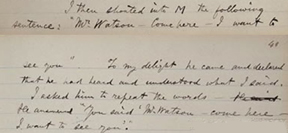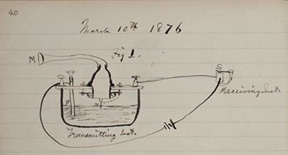Behind the Dictionary
Lexicographers Talk About Language
The Telephone is 133 Years Old. Call Me.

On the 133rd birthday of the telephone, Dennis Baron ponders how Alexander Graham Bell's invention forever changed the way we communicate — and brought the word "hello" into common usage. Baron is professor of English and linguistics at the University of Illinois and writes regularly on linguistic issues at The Web of Language.
One hundred and thirty-three years ago, on March 10, 1876, Alexander Graham Bell demonstrated that the human voice could be transmitted electrically across wires by shouting the famous words, "Mr. Watson — Come here — I want to see you," into the telephone that he had constructed. As Bell wrote in his lab notebook, "To my delight he came and declared that he had heard and understood what I said." To prove it, Watson repeated Bell's words verbatim.

Bell had to shout into the receiver because the electrical signal lost strength as it traveled from one room to the next. The sound quality was poor as well. When the two men changed places and Watson spoke into the device, Bell couldn't understand the passage that Watson read from a book:
I could not make out the sense, but an occasional word here and there was quite distinct. I made out "to" and "out" and "further", and finally the sentence "Mr. Bell Do you understand what I say? DO-YOU-un-der-stand-what-I-say" came quite clearly and intelligibly.

Excerpts from Bell's notebook dated March 10, 1876,
describing the first electrical voice transmission [Library of Congress]
Bell described the telephone in his patent application in the technical language of "electrical undulations" and "sinusoidal curves." But he promoted it to the public as idiot-proof: "The great advantage it possesses over every other form of electrical apparatus consists in the fact that it requires no skill to operate the instrument."

Sketch of the idiot-proof telephone, from Bell's notebook [Library of Congress]
Telephone users did have to learn how to conduct a conversation which lacked the important cues of face-to-face encounters — eye contact and body language. And because of the poor sound quality, they had to adjust the volume of their voice and speak more precisely than they did for "f2f."
They also had to learn how to begin and end a phone call. Since the first phones had no ringers, Bell announced his calls by shouting "Hoy" into the receiver (we still use ahoy in naval contexts). Other callers preferred "Hello," a rare word that was used to evince surprise (as in, "Hello, what have we here?"), or to attract the attention of someone who was some distance off (it wasn't appropriate to say "Hello, sailor" unless you were on one boat and the sailor was on another). Thanks to the telephone, hello quickly became part of our non-phone greeting vocabulary as well, a fine example of technology interfacing with language.
Callers in Bell's day also had to learn to carry on their conversations in public. Privacy wasn't an option, as the first phones were placed in centralized, high-traffic areas of offices and homes, and the technology made whispering impractical. In addition, telephone operators, known in the slang of the day as hello-girls, were required to listen in from time to time to make sure no one was misusing Ma Bell's equipment (subscribers only; no swearing allowed) and to see whether the circuit was still in use, since those first phones didn't automatically disconnect when you hung up.
Comfortable as we've gotten after all these years of phoning, today's mobile telephony requires adjustments to our behavior just as the first wired phones did, and while cell technology seems to move communication forward, in some ways it also brings us back.
For example, now that we finally figured out how to be discreet on land lines, mobile phone users, who raise their voices even though the technology doesn't require it, have regressed to the days of PDC, public displays of conversation. Acting as if they were completely alone, mobile callers chatter away loudly on the street, in the train, or while dining someplace cozy, in conversations which seem impenetrable or inane or just annoying to bystanders who can't get out of earshot. Callers draw even more attention if they're on a Borg-like Bluetooth, hands gesticulating wildly, eyes riveting perfect strangers while addressing someone miles away. Of course, if everyone else is also on the phone, then no one's left to eavesdrop. And for the few who're not calling or being called, resistance seems futile.
All new technologies have their critics. In 1849 Henry David Thoreau criticized Samuel Morse's popular telegraph because, although it connected people from Maine to Texas, they still had nothing to say to one another. Morse, in turn, saw no potential in Bell's telephone: who would use a technology for anything important if it didn't create a written record of what was said?
The phone's obvious usefulness trumped any objections from the critics, and the cell phone is even more popular than Bell's phones were, despite the complaints lodged against it. Yet mobile phones return us to the days of yesteryear in one more way: callers are shifting in droves from talk to text. They're not doing it to be polite (okay, maybe in Japan they are, but not in the U.S.), and we already know that cell phone users don't seem overly finicky about privacy. Rather, they insist that text is less intrusive than calling, and that they're just more comfortable texting than talking. At least that's what they texted me.
So, even though 133 years isn't a centennial, bicentennial, or jubilee, on the anniversary of Bell's invention, give me a shout, call me, or better yet, send me a text, even though you and I may have nothing important to communicate.


